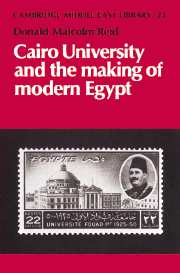Book contents
- Frontmatter
- Contents
- List of illustrations
- List of tables
- Acknowledgments
- Note on academic terminology and transliteration
- List of abbreviations
- Introduction
- Part I The private university, 1908–1919
- Part II The university and the liberal ideal, 1919–1950
- 4 The transition to a state university
- 5 Rival imperialisms and Egyptianization
- 6 Issues of equity: a university for whom?
- 7 The university and politics, 1930–1950
- 8 The issue of religion
- Part III In Nasser's shadow, 1950–1967
- Part IV The university since Nasser
- Conclusion and prospect
- Notes
- Select bibliography
- Index
5 - Rival imperialisms and Egyptianization
Published online by Cambridge University Press: 30 October 2009
- Frontmatter
- Contents
- List of illustrations
- List of tables
- Acknowledgments
- Note on academic terminology and transliteration
- List of abbreviations
- Introduction
- Part I The private university, 1908–1919
- Part II The university and the liberal ideal, 1919–1950
- 4 The transition to a state university
- 5 Rival imperialisms and Egyptianization
- 6 Issues of equity: a university for whom?
- 7 The university and politics, 1930–1950
- 8 The issue of religion
- Part III In Nasser's shadow, 1950–1967
- Part IV The university since Nasser
- Conclusion and prospect
- Notes
- Select bibliography
- Index
Summary
Egypt's partial independence after 1922 enabled King Fuad to revive the old game of playing France off against Britain. The French were more than willing to play. Fuad pressed for Frenchmen at the university, or failing that, Italians and Belgians. Britain, of course, fought back. A few German professors came in the 1930s, but neither they nor the Italians had much influence. Meanwhile Egyptians were slowly replacing the Europeans, but not fast enough to suit many nationalists. Everyone found internationalist academic ideals easier to extol than to practice.
Even as Egyptian professors were coming in, vexing questions about the language of instruction and publication remained. Nationalists pushed for Arabic, but the need to belong to a Western-dominated international community of scholars led many professors to retain English.
Lord Lloyd versus the “Latins”
When the decree founding the state university came out on March 11, 1925, High Commissioner Allenby's attention was elsewhere. The parliamentary elections the next day were his last chance to show that his Egyptian “moderates” could stabilize things and protect British interests. When the Wafd won the elections and Fuad prorogued the chamber, Allenby knew the game was up. As he prepared to leave, a memo from his Financial Adviser hardly rang alarm bells about the university:
The outlook, it will be seen, is not very bright and I cannot think that the University will ever be a serious body or be anything but a University in name without educational value.
- Type
- Chapter
- Information
- Cairo University and the Making of Modern Egypt , pp. 87 - 102Publisher: Cambridge University PressPrint publication year: 1990



